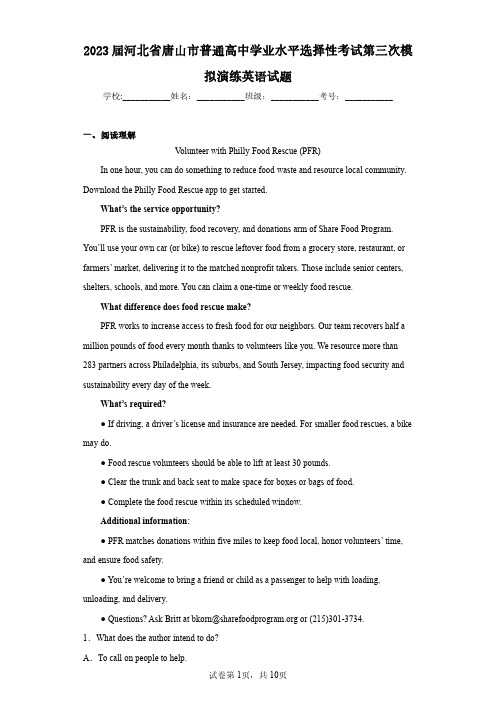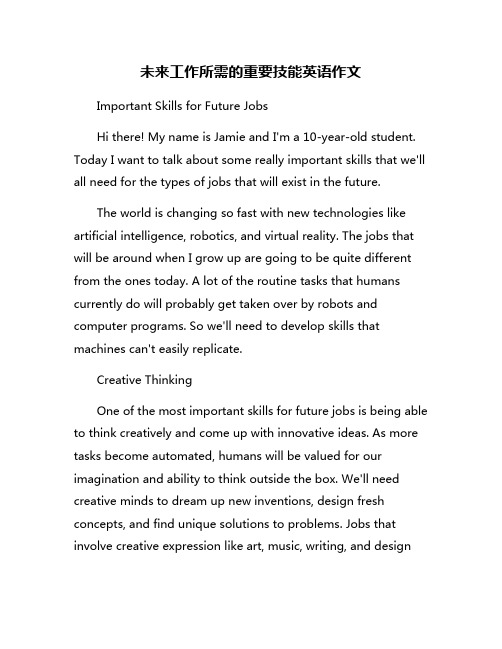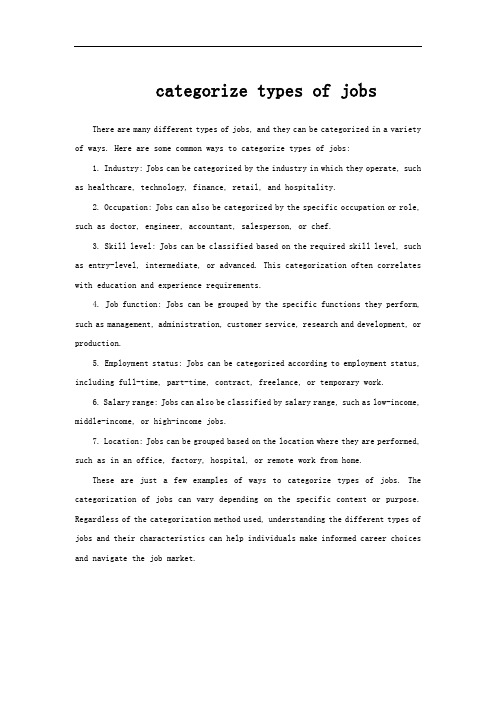Jobs matched to workers’ skills
选择性必修三Unit7 lesson3

选择性必修三Unit7 Lesson31.profession n.专业,行业→professional adj.专业的;职业的2.retirement n.退休,退职→retired adj.退休的→retire v.退休3.innovator n.革新者,创新者→innovative adj.新颖的,创新的,革新的→innovate v.革新,创新→ innovation n.革新,创新4.specialist n.专家→special adj.特别的5.occupation n.工作,职业;消遣,业余活动;侵占,占领→occupy vt.占用,占去(时间)→ occupied adj.使用中,有人使用或居住(不用于名词前);忙于(不用于名词前);被占领的,被侵占的6.qualify v.取得资格(或学历)→qualification n.资格,资历→qualified adj.具备……的资历/学历;具备……的知识/技能,符合资格7.multiple adj.多的,多重的,设计多个人(物,事等)的→multiply v.乘;成倍增加8.essential adj.极其重要的;最基本的→essence n.本质,实质;精髓9.security n. 安全;保证;证券→secure adj. 稳定的;无忧无虑的11.employer n.雇主;雇佣者→employee n.雇员12.relevant adj. 有关的,切题的→relevance n.关联→relevantly adv. 有关地;切题地重点单词与短语精析★课标词▲高频词★1. occupation【用法归纳】(1)n.[C]职业,工作▶I suppose I was looking for an occupation which was going to be an adventure.我想我在找的是一份具有冒险性的工作。
(2)n.[C]消遣,业余活动▶Swimming was their main occupation at summer camp.游泳是他们在夏令营的主要消遣。
九年级英语职场技能词汇单选题30题

九年级英语职场技能词汇单选题30题1. When you start a new job, you need to ______ your skills to the tasks.A. applyB. useC. employD. take答案:A。
“apply”有“应用、运用”的意思,强调将技能用于特定的任务或情况;“use”较普遍,使用范围广;“employ”侧重于雇佣或利用(人);“take”常见意思是“拿、取”,在此语境不合适。
本题说的是将技能用于工作任务,“apply”最贴切。
2. In the workplace, it's important to ______ good relationships with your colleagues.A. buildB. makeC. createD. form答案:A。
“build”侧重于逐步建立、构建,常指建立长期的、稳固的关系;“make”比较口语化,强调制造、做;“create”强调创造出全新的东西;“form”有形成、构成的意思,但“build”更能体现出在职场中建立良好关系需要时间和努力。
所以选A。
3. If you want to succeed in your career, you have to ______ hard.A. workB. laborC. striveD. effort答案:C。
“work”和“labor”都有工作的意思,但比较普通;“strive”表示努力奋斗、力求,程度更深,更符合想要在职场成功需要付出很大努力的语境;“effort”是名词,不是动词。
因此选C。
4. The boss asked me to ______ a report about the project.A. writeB. composeC. draftD. produce答案:C。
“write”泛指写作;“compose”通常指创作音乐、诗歌等;“draft”有起草、草拟的意思,更符合为项目写报告的初步阶段;“produce”侧重于生产、制造。
高中英语学业水平考试试卷

2023届河北省唐山市普通高中学业水平选择性考试第三次模拟演练英语试题学校:___________姓名:___________班级:___________考号:___________一、阅读理解Volunteer with Philly Food Rescue(PFR)In one hour,you can do something to reduce food waste and resource local community. Download the Philly Food Rescue app to get started.What’s the service opportunity?PFR is the sustainability,food recovery,and donations arm of Share Food Program. You’ll use your own car(or bike)to rescue leftover food from a grocery store,restaurant,or farmers’market,delivering it to the matched nonprofit takers.Those include senior centers, shelters,schools,and more.You can claim a one-time or weekly food rescue.What difference does food rescue make?PFR works to increase access to fresh food for our neighbors.Our team recovers half a million pounds of food every month thanks to volunteers like you.We resource more than 283partners across Philadelphia,its suburbs,and South Jersey,impacting food security and sustainability every day of the week.What’s required?●If driving,a driver’s license and insurance are needed.For smaller food rescues,a bike may do.●Food rescue volunteers should be able to lift at least30pounds.●Clear the trunk and back seat to make space for boxes or bags of food.●Complete the food rescue within its scheduled window.Additional information:●PFR matches donations within five miles to keep food local,honor volunteers’time, and ensure food safety.●You’re welcome to bring a friend or child as a passenger to help with loading, unloading,and delivery.●Questions?Ask Britt at**************************or(215)301-3734. 1.What does the author intend to do?A.To call on people to help.B.To inform people of food rescue.C.To introduce ways of volunteering.D.To entertain people with a new concept.2.What do we learn about PFR service?A.It donates to Share Food Program.B.It covers the national senior centers.C.Its rescues have appointed receivers.D.Its aim is to help the stores or markets.3.What is required of every volunteer?A.Medical insurance.B.Scheduling skills.C.Driving experience.D.Weight lifting power.Last week,three days of cold rain had everyone in our house feeling a bit bad-tempered, especially my kid,who couldn’t go out to play.Then the music app on my phone recommended a station called“Rainy Day Jazz.”As the soft piano played,my daughter and I hugged closely,feeling comfortable and relaxed.Suddenly,our day was enjoyable.It turned out that Rainy Day Jazz was just the thing we needed.Life—especially life with young children—can often feel very busy and rushed.One of the great benefits of music is that it offers a safe and dependable place to feel our feelings. When we are afraid,sad,or happy,we can invite music in.Kids can be great at expressing their emotions,but they don’t always have the ability to regulate them and move through them.When kids engage with music,a sense of emotional security is increased,allowing them to feel safer to fully experience their feelings.Music has been a community practice throughout human history.Studies show that in early childhood,playing music in groups can increase cooperation skills and a sense of social belonging.In Pinkalicious and Peterrific,an educational children’s TV series,Peter is eager to share his musical experiences with others.Together,Pinkalicious and Peter make up their own happy song to sing and play,which cheers up the whole town.Music is for everyone.Lots of parents feel like they don’t have enough talent for music. Actually,they should let go of their insecurities about what they think music should be.Kids will love singing,dancing,and playing music with you no matter how it sounds.What’s the most important is to get them emotionally engaged.Ready to rock and roll?Here are some ways your family can interact with music.Make music accessible.You can empower your child to use music as an emotional support by giving them access to the tools they need.Talk about music.You can help your child explore the relationship between music and emotions by talking openly about your own relationship with music.Get your bodies moving.Children experience music in their bodies—not just in their minds!Music and movement are partners.4.What is paragraph2mainly about?A.Kids are able to adjust their emotions.B.Kids do well in showing their feelings. C.Music benefits children in many aspects.D.Music is a safe way to experience emotions.5.What does the author intend to tell us by mentioning a TV series?A.Music creates connection.B.Playing music brings fun. C.Cooperation skills are vital.D.Children are eager for music. 6.What does the author suggest parents do?A.Get rid of unnecessary worry.B.Become more skilled in music. C.Purchase expensive instruments.D.Get to know their own limitations. 7.How many ways of interacting with music are introduced?A.One.B.Two.C.Three.D.Four.It’s no secret that our jobs can have a major impact on our lives outside of work.But what many employers don’t realize is that how employees spend their time at work can have substantial spillover effects on their children.To explore the impact of parents’work on their children’s development,my team conducted a study that followed more than370low-wage,working-class families over more than ten years.We intentionally focused on low-wage families,as they generally receive far less attention in the work-family literature while facing some of the greatest challenges.We, therefore,could get more authentic data.We completed in-home interviews and first-hand observations of parent-child interactions with strict assessments and reports from parents and teachers.The data showed that parents who experienced more autonomy on the job and who had more-supportive managers and coworkers were in turn warmer and more engaged when interacting with their kids.Checking back in with these families years later,we consistentlyquestions,by which I mean questions that you fear make you look stupid.But I’m worried this is a dying art.Best questions from students,the ones that they worry might be silly but are actually very useful,tend to come during breaks or on the walk between buildings after the lecture has ended.When teaching moved online,those opportunities disappeared.But many academics discovered online tools actually made it easier for some,students to ask questions.Platforms like Mentimeter added an extra layer of comfort by allowing students to ask questions without stating their identities.Some academics have integrated these online tools into their face-to-face lectures.There is clearly some value in this.But what if we are losing something too?The more we use technology to remove ourselves from the discomfort of asking questions,the more fearful we might grow about doing it face to face.One academic got so frustrated by the silence in lectures that he brought in a softball and told his students,“I’m going to throw this out and whoever catches it has to ask me a question.Any question.”He said they looked at the ball like it was a hand bomb.Yet asking someone questions face to face can be the best way to ensure you really understand something.I know not everyone is lucky enough to have a Martin Wolf wandering by.But most people really don’t mind being asked something“stupid”.If they do,it is probably because they don’t really understand it themselves,or they have something to hide. In that sense,you learn something useful either way.12.Why does the author describe his own experience in paragraph1?A.To prove his belief.B.To praise Martin Wolf.C.To speak of his worry.D.To share his experience. 13.What does the author think of online questioning tools?A.They are extra comforting.B.They are potentially harmful. C.Their performance was terrible.D.Their value is beyond imagination. 14.How did the students feel when looking at the ball?A.Calm.B.Excited.C.Anxious.D.Surprised. 15.Which statement will the author probably agree with?A.Be confident,be successful.B.Communicate in a clever way. C.Don’t be foolish in front of others.D.Ask more questions,understand better.二、七选五三、完形填空“Dad,just touch the green button!The one with a little picture of a telephone on it!”I四、用单词的适当形式完成短文五、其他应用文46.假定你是李华。
职业技能等级考证题库

职业技能等级考证题库英文回答:1. What are the different levels of occupational skills certification?There are three main occupational skills certification levels, which are:Level 1: This level is for entry-level workers with little or no experience in a particular job.Level 2: This level is for workers with some experience in a particular job and who are ready to take on more advanced responsibilities.Level 3: This level is for experienced workers who have extensive knowledge and skills in a particular job.2. What are the benefits of obtaining occupationalskills certification?There are many benefits to obtaining occupationalskills certification, including:Increased earning potential: Workers with occupational skills certification can earn more money than those without certification.Improved job opportunities: Occupational skills certification can help workers qualify for better jobs.Enhanced job performance: Occupational skills certification can help workers improve their performance on the job.Greater job satisfaction: Workers with occupational skills certification are more likely to be satisfied with their jobs.3. How do you prepare for occupational skills certification?There are a number of ways to prepare for occupational skills certification, including:Taking courses: There are many courses available that can help workers prepare for occupational skills certification.Reading books: There are many books available that can help workers prepare for occupational skills certification.Studying online: There are many online resources available that can help workers prepare for occupational skills certification.Working in a related field: Gaining experience in a related field can help workers prepare for occupationalskills certification.4. Where can you find occupational skills certification?There are many organizations that offer occupationalskills certification, including:The National Board of Professional and Technical Examiners (NBPTEX)。
未来工作所需的重要技能英语作文

未来工作所需的重要技能英语作文Important Skills for Future JobsHi there! My name is Jamie and I'm a 10-year-old student. Today I want to talk about some really important skills that we'll all need for the types of jobs that will exist in the future.The world is changing so fast with new technologies like artificial intelligence, robotics, and virtual reality. The jobs that will be around when I grow up are going to be quite different from the ones today. A lot of the routine tasks that humans currently do will probably get taken over by robots and computer programs. So we'll need to develop skills that machines can't easily replicate.Creative ThinkingOne of the most important skills for future jobs is being able to think creatively and come up with innovative ideas. As more tasks become automated, humans will be valued for our imagination and ability to think outside the box. We'll need creative minds to dream up new inventions, design fresh concepts, and find unique solutions to problems. Jobs that involve creative expression like art, music, writing, and designwill likely grow. But every field will need creative thinkers who can bring new perspectives.In school, we can practice creative thinking through activities like creative writing, art projects, coming up with new game ideas, and solving open-ended problems. At home, we can exercise our creativity through crafting, baking, telling stories, or just using our imaginations when playing. It's all about training our minds to explore ideas from new angles.Adaptability and Lifelong LearningThe pace of change will keep accelerating in our lifetimes. Many of the specific job roles that will exist in 30 years haven't even been invented yet! So we'll all need to be adaptable learners, ready to upskill and reskill throughout our careers as industries transform around us. Having a curious mindset, being open to new ideas, and loving to learn will be vital.School helps us build learning skills through exploring different subjects and topics each year. But we'll need to take responsibility for our own lifelong learning journeys too. We can practice adapting to new situations through activities like learning a new game, taking up a new hobby, or traveling somewhere new. It stretches our flexibility and openness to unfamiliar experiences.Communication and CollaborationEven as technology progresses, human beings will still need excellent communication skills to effectively share ideas. We'll have to communicate not just with other people, but increasingly with artificial intelligence systems too. Being able to clearly express yourself, whether through writing, speaking, visuals or multimedia, will make you invaluable.Collaboration skills will also remain highly relevant as we work together on complex projects that combine human ingenuity with technological capabilities. We'll need interpersonal skills like empathy, active listening, giving feedback, resolving conflicts, and uniting diverse perspectives. Bothin-person teamwork and remote virtual collaboration across globally dispersed teams will be commonplace.At school, we practice these skills through group projects, classroom discussions, show-and-tell presentations, and writing assignments. Extracurricular activities like team sports, debate clubs, and volunteering also build these capabilities. Having diverse friend groups and socializing with different types of people helps too.Digital and Tech ProficiencyTechnological skills will be essential for almost every career path and woven into our daily lives. We'll interact with incredible technologies like augmented and virtual reality, advanced robotics and automation, artificial intelligence, biotechnology, and more. Having proficiency with computers, digital devices, and emerging technologies will be baseline requirements.Beyond just using the tools, we'll need to understand how they work to properly leverage them. That means developing skills like coding, data analysis, systems thinking, cybersecurity awareness, and comfort with rapidly evolving innovations. Even roles that aren't directly tech-focused will require these savvy digital skills.Many schools now teach coding from an early age and use educational technologies in the classroom. At home, we can build digital skills through activities like making digital art, shooting videos, building websites or apps, or modding video games. The key is developing hands-on experience and fluency with different technologies from a young age.Problem-Solving and Critical ThinkingAs knowledge workers, a core part of our value will lie in our ability to interpret information, analyze data, recognize patterns, and solve problems in a structured way. With so muchinformation and data available, discernment in evaluating different sources, filtering out misinformation, and making sense of it all will be crucial.Critical thinking skills like reasoning, questioning assumptions, considering different perspectives, and thinking several steps ahead will be highly valuable. So will creativity in combining insights from different disciplines to spark new ideas. We'll need to solve complex, open-ended problems that don't have one clear answer.In school, we develop these abilities through assignments that push us to research topics, evaluate evidence, formulate arguments, and apply knowledge in new situations. Classes that integrate multiple subject areas also encourage connecting different concepts. Games and puzzles that make us think strategically and from new vantage points help too.Social and Emotional IntelligenceWhile technical skills will be important, human skills will be equally vital to thriving in the future workforce. As we collaborate more with both humans and AI systems, we'll need strong interpersonal and emotional intelligence. Self-awareness, empathy, adaptability, and the ability to understand different perspectives will be highly valued.We're developing these soft skills through our daily interactions and relationships from a young age. Practicing mindfulness by paying attention to our thoughts and feelings builds self-awareness. Talking through disagreements with friends and finding compromises builds conflict resolution abilities. Joining group projects and team activities grows our collaborative skills.While nobody can fully predict exactly what the future will look like, developing a mix of technical and human skills will prepare us to adapt to whatever changes come our way. By nurturing our creativity, curiosity, emotional intelligence and ability to collaborate with both humans and machines, we can continue to find meaningful work in an ever-evolving world. The future of work will be an incredible adventure! What an exciting time to be alive.。
英语翻译1

光棍节来临:中国单身男女心酸寻爱记中国“光棍节”,一个庆祝(或哀嚎)没人相伴的节日。
光棍节起源于90年代中期,由南京的几位大学生创立,节日定在每年的11月11日,因为这四个光秃秃的数字,看上去像极了“光棍”。
Singles Day in China is the celebration -- or mourning -- of being unattached. Started by students in Nanjing in the mid-1990s, the date was selected in observation of its four solitary digits:11/11.虽然光棍节在其他国家的文化中看来有些难以理解,但在中国,光棍节的影响力越来越大,在中国有越来越多的单身男性找不到女朋友。
据中国社会科学院最近的一项调查显示,到2020年全中国将有2400万男性找不到配偶。
While relatively obscure in most other countries, Singles Day is likely to increase in prominence as more single men in China are unable to find female partners. According to a recent study by the Chinese Academy of Social Sciences, more than 24 million Chinese men could find themselves without spouses by 2020.中国各地均有不同形式来庆祝光棍节的仪式。
就和圣诞节、情人节一样,光棍节已经成了一门能创造几百万收益的产业。
Celebrating Singles Day comes in many forms across the Asian nation, and like Christmas and Valentine's Day, it has become a multi-million dollar industry.北京市中心一家叫菲格树的高级烘焙学校,从这周四起开始招收学习松露巧克力的学生。
categorize types of jobs

categorize types of jobsThere are many different types of jobs, and they can be categorized in a variety of ways. Here are some common ways to categorize types of jobs:1. Industry: Jobs can be categorized by the industry in which they operate, such as healthcare, technology, finance, retail, and hospitality.2. Occupation: Jobs can also be categorized by the specific occupation or role, such as doctor, engineer, accountant, salesperson, or chef.3. Skill level: Jobs can be classified based on the required skill level, such as entry-level, intermediate, or advanced. This categorization often correlates with education and experience requirements.4. Job function: Jobs can be grouped by the specific functions they perform, such as management, administration, customer service, research and development, or production.5. Employment status: Jobs can be categorized according to employment status, including full-time, part-time, contract, freelance, or temporary work.6. Salary range: Jobs can also be classified by salary range, such as low-income, middle-income, or high-income jobs.7. Location: Jobs can be grouped based on the location where they are performed, such as in an office, factory, hospital, or remote work from home.These are just a few examples of ways to categorize types of jobs. The categorization of jobs can vary depending on the specific context or purpose. Regardless of the categorization method used, understanding the different types of jobs and their characteristics can help individuals make informed career choices and navigate the job market.。
高考英语话题通关精准练:专题17 职业与技能(词汇+阅读+写作)(解析版)

专题17 职业与技能(词汇+阅读+写作)(教师版)距离高考还有一段时间,不少有经验的老师都会提醒考生,愈是临近高考,能否咬紧牙关、学会自我调节,态度是否主动积极,安排是否科学合理,能不能保持良好的心态、以饱满的情绪迎接挑战,其效果往往大不一样。
以下是本人从事10多年教学经验总结出的以下学习资料,希望可以帮助大家提高答题的正确率,希望对你有所帮助,有志者事竟成!养成良好的答题习惯,是决定高考英语成败的决定性因素之一。
做题前,要认真阅读题目要求、题干和选项,并对答案内容作出合理预测;答题时,切忌跟着感觉走,最好按照题目序号来做,不会的或存在疑问的,要做好标记,要善于发现,找到题目的题眼所在,规范答题,书写工整;答题完毕时,要认真检查,查漏补缺,纠正错误。
总之,在最后的复习阶段,学生们不要加大练习量。
在这个时候,学生要尽快找到适合自己的答题方式,最重要的是以平常心去面对考试。
英语最后的复习要树立信心,考试的时候遇到难题要想“别人也难”,遇到容易的则要想“细心审题”。
越到最后,考生越要回归基础,单词最好再梳理一遍,这样有利于提高阅读理解的效率。
另附高考复习方法和考前30天冲刺复习方法。
一:话题词汇过关1.engineer n工程2.mechanic n机械师3.surgeon n外科医生4.astronomer n天文学家5.photographer n摄影师6.librarian n图书管理员7.secretary n秘书8.creative adj有创造性的9.confident adj有信心的、10.persuasive adj有说服力的11.observant adj善于观察的12.technical adj技术的13.organized adj有组织的;有条理的14.responsible adj负责的15.launch vt开始从事;开办16.recommend vt推荐17.career n职业;事业18.investment n投资19.attitude n态度20.preference n爱好21.secretary n秘书22.assistant n助手23.monitor n班长24.president n总统;主席25.interviewee n被采访者26.applicant n申请人27.junior n职位较低者28.capable adj有能力的;有技能的29.diligent adj勤勉的;勤奋的30.fire v解雇31.qualified adj有资格的32.skilled adj熟练的;有技能的33.diligent adj勤勉的;勤奋的34.talented adj有才能的;有天赋的35.well-paid adj高薪的36.unemployed adj失业的;被解雇的37.vacant adj(职位)空缺的;未被占用的38.part-time adj兼职的39.requirement n要求40.degree n学位41.simple adj简单的42.straightforward adj坦率的43.diligent adj勤奋的44.easy-going adj随和的45.average adj普通的46.special adj特别的,特殊的47.passion n激情,热情48.innovation n 创新49.devotion n 献身,奉献50.endure v忍受51.refuse v拒绝52.integrity n正直53.confident adj自信的54.courage n勇气;胆略55.creative adj富有创造力的56.admire v钦佩,羡慕57.leading adj重要的,主要的58.spread n 传播59.celebrated adj著名的,闻名的60.breakthrough n突破61.achievement n成就62.respected adj备受尊重的63.accomplish v完成64.highly adv高度地二:话题短语表达过关1.make choices做出选择2.be suited to适合3.be useful for对……有用处4.make contributions to对……做出贡献5.be of importance重要6.devote one’s life to一生致力于7.get a good grade得到好的分数8.pass the entrance examinatio n通过入学考试9.take on responsibilities承担责任10.be appropriate for对……合适11.career aptitude test职业能力倾向测试12.head start起步前的优势13. a sense of achievement and great satisfaction成就感和巨大的满足感14.provide room for personal growth为个人成长提供空间15.practise our skills锻炼我们的技能16.provide an opportunity for the applicant给面试者提供一个机会17.prior to the interview面试前18.make good preparations做好准备19.make a good first impression留下良好的第一印象20.listen carefully to the questions仔细倾听问题21.work experience工作经验22.graduate from in毕业于……学校……专业23.have a rich knowledge of拥有……方面丰富的知识24.have an advantage over sb比某人有优势25. a strong personality很强的个性26.in one’s thirties在某人三十几岁时27.devote to献身于28.focus on致力于,专注于29.seek no fame不求名利30.with great resolution 下定决心31.overcome harsh conditions 克服艰苦的环境32.be experienced in 在……方面有经验33.more than不仅仅34.contribute to 引起,导致35.of all time 有史以来36.lead to引起,导致37.win great acclaim赢得极大的称赞38.play a key role in在……扮演重要角色三:话题句型练笔1:I wish I had thought more about what I really wanted to do.我真希望当年能再多想想自己真正想要做什么。
- 1、下载文档前请自行甄别文档内容的完整性,平台不提供额外的编辑、内容补充、找答案等附加服务。
- 2、"仅部分预览"的文档,不可在线预览部分如存在完整性等问题,可反馈申请退款(可完整预览的文档不适用该条件!)。
- 3、如文档侵犯您的权益,请联系客服反馈,我们会尽快为您处理(人工客服工作时间:9:00-18:30)。
/system.htmlJobs matched to workers’ skills毕业在即,你对于自己的第一份工作有何打算?对于职业生涯有没有计划?仓促上岗使不得,每份工作都会影响你未来发展的轨迹哦~As graduation draws near, those who haven’t landed a job yet may be desperate to find one. Perhaps some of the job offers they have received are below their skill and experience levels. Is it better to take these offers, or reject them and remain unemployed?毕业临近,还没找到工作的同学可能迫切想找到一个职位。
也许,他们得到的工作机会以自己目前的技能和经验远远可以胜任。
那么,究竟是该接受这样的职位,还是拒绝掉继续等待机会呢?A recent study conducted by a University of Texas sociologist may give soon-to-be grads some food for thought. It’s about how taking a job below your skill level could affect your prospects for future employment. The result of the study is: It matters a lot.最近,美国德克萨斯大学的一位社会学家做了一份调查,结果可能会让即将毕业的同学们好好思考一番。
这份有关―接受低于自身技能水平的工作,可能会影响未来就业前途‖的调查。
其结果证明:这两者之间关系紧密。
―A history of skills underutilization is as scarring for workers as a year of unemployment,‖ according to David Pedulla, whose study on the topic appeared in the American Sociological Review.―自身能力不能充分施展,对于就业者来说,就像待业一年那样可怕,‖大卫•裴多拉表示,他的研究登上了《美国社会学评论》期刊。
Pedulla explored his interest in what he calls ―labor market inequality‖ by developing resumes for imaginary job applicants. The job seekers he created had a few things in common. They had a college degree, worked/system.htmlnearly two years at their first job, and worked about four and a half years at their second job.通过给虚构的求职者设计简历裴多拉探索了他感兴趣的领域,他称之为―劳动力市场不平等‖。
他在试验中设计出许许多多应聘者,他们有很多相同之处。
比如,都具备大学本科学历,第一份工作干了两年,第二份工作干了4年半等等。
What differed was their third job – the one Pedulla created for them for the most recent year. His imaginary workers either had a full-time job that matched their skills, a part-time job, a job below their skill level, or were unemployed.然而不同之处出现在第三份工作——这也是裴多拉对于应聘者的特殊设计。
他设想中的就业者,要么拥有一份匹配能力的全职工作,要么是一份低于自身技能水平的兼职工作,要么干脆待业。
Then Pedulla submitted 2,420 resumes based on his imaginary job seekers, along with cover letters, to online ads for 1,210 real jobs. Each of the applicants had an email address and real phone number that employers could contact if they were interested in talking with the applicant further.裴多拉为其设想中的求职者一共提交了2420份简历和相应的求职信,去应聘网络广告中的1210个真实岗位。
每份应聘资料中都有电子邮箱地址以及真实的电话号码,如果雇主对于应聘者感兴趣可以进一步联络。
The callback rates varied widely based on how the imaginary job seeker had spent their last year. Pedulla said employer interest in his fictional applicants reflected what kind of signals the applicant’s most recent job history sent to hiring managers, including how competent they were and how committed they were to their careers.就业者最后一年经历的不同,导致了雇主回电率的不同。
裴多拉表示,雇/system.html主对于这些虚拟应聘资料的兴趣,反映出的是应聘者最近一段经历释放给雇主的信号,比如他们的竞争力,以及他们对于职业的投入程度。
Male and female applicants who had full-time jobs the previous year were called back 10.4 percent of the time. Those whose most recent year of employment was in a job that was below their skills level were only called back about 5 percent of the time. Male applicants who had been unemployed for a year were called back 4.2 percent of the time, while unemployed females were called back 7.5 percent of the time.在众多应聘者中,前一年拥有全职工作的人,雇主回电率为10.4%。
而前一年的工作技能要求不如自身水平的应聘者,回电率只有5%。
男性应聘者待业一年的回电率为4.2%,而待业的女性应聘者的回电率为7.5%。
The study also showed that holding a part-time position over the previous year hurt men much more than it did women. Men with a year of part-time work only were called by employers 4.8 percent of the time, while the figure is 10.9 percent for women. ―Men face severe penalties for part-time work histories, but women experience no penalties,‖ Pedulla wrote.这份研究同样表明,应聘前一年做兼职工作,对于男性的伤害要大于女性。
兼职一年男性的得到雇主回电率为4.8%,兼职一年的女性应聘者得到的雇主回电率为10.9%。
裴多拉在研究中写道:―男性面临兼职工作经历带来的严重影响,然而女性拥有这样的经历并没有多大影响。
‖However, Pedulla cautioned that there are some limits about what lessons can be taken from the experiment. It only measured the initial interest of employers in his fictional job candidates, not whether the employer would hire them or what they would be paid based on their most recent job experience. And he only conducted the study in five major cities, and doesn’t know whether he would have gotten the same results in smaller labor markets.然而,裴多拉也提醒大家,从实验中学到的东西有局限性。
实验只测算出/system.html了雇主对于虚拟应聘者的最初兴趣,但是并没有测算出雇主是否会雇用他们,或者应聘者最近的工作经历会让他们获得什么样的薪水。
而且,裴多拉的实验只在五个城市进行,他并不清楚在其他小规模的劳动力市场中,是否还会得到相同的结果。
文本来源:佛山英语培训学校“爱德华国际英语”。
